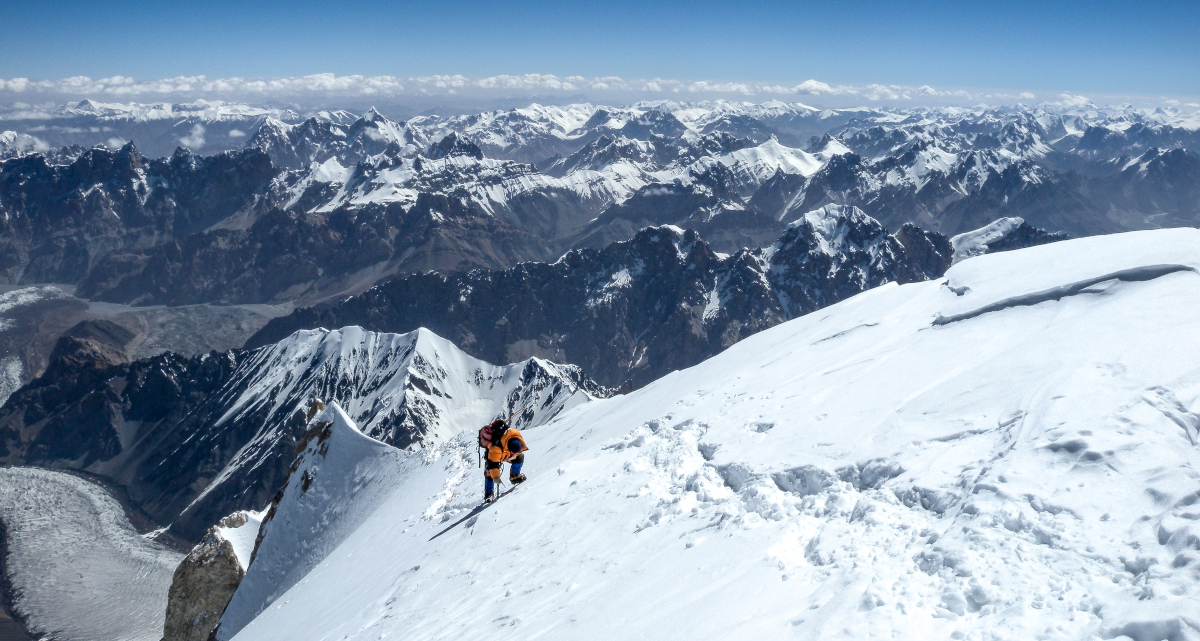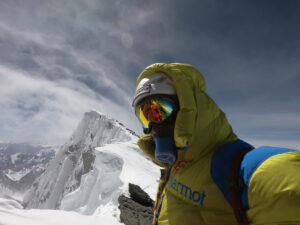By Fredrik Sträng
Do you find yourself in situations where you give it your all but nothing seems to get done? It’s a myth that you can do several things at once. We can only switch between different tasks so quickly. And in this article, Sweden’s foremost high-altitude climber, Fredrik Sträng, and esteemed speaker, discusses the success that comes with fully dedicating yourself to one task at a time.
“I hate plan B,” Arnold Schwarzenegger.
The Apprentice and the Master
A young apprentice arrived at a remote monastery in Thailand to meet his master and seek guidance in his spiritual quest. He had heard of the master’s wisdom and longed to learn from him. But when he arrived at the monastery, he found it nearly impossible to get near the master. All the monks attended to him and crowded around him like an impenetrable wall.
Disappointed that he wouldn’t get to meet the master, the apprentice decided to wait. Days went by, but he didn’t get a word in edgewise. The master was guarded, and he couldn’t possibly get through. Disappointed that he couldn’t ask all his profound questions about life and existence, he sat down in the garden outside the monastery and sank into deep thoughts while waiting for his taxi to take him back to the city.
As the apprentice sat there in silence and reflection, he noticed that the garden was covered in leaves and that a rake lay beside him. Despite not getting to meet the master, the apprentice decided to do something meaningful with his wait. He picked up the rake and began carefully clearing the leaves from the lawn.
Time passed, and the apprentice
continued his work with the rake. He immersed himself in the task and put all
his concentration and energy into making the garden beautiful and well-tended.
In the midst of raking, the master emerged from the monastery and saw the beautiful work the apprentice had done. With a smile on his lips, the master said to the apprentice, “When you rake, give it all you got.” Then he went on his way. The apprentice was speechless and couldn’t get a word out. What on earth did the master mean?
That’s how you should approach every task in life – with complete dedication and presence.
The apprentice realized that the master’s words were a guide not only to understanding the art of raking but also to living his life with mindfulness and dedication in every moment. Not only does it bring harmony and meaning, but it also makes us effective, and we get the task done.
Focus on the Mountain
What do you think I’m pondering when I’m climbing exposed ridges on 8000m peaks where each step could be my last? Am I thinking about whether I forgot the stove on at home, or if I neglected to lock the door before leaving safe and comfortable Sweden behind?
Nepalese people call the altar we build at the base camp during an expedition a Stupa. A Stupa consists of perfectly organized and stacked stones forming a square tower. Prayer flags are drawn from its top and stretched in every direction over the base camp. Incense flows from the altar, holy rice fills aluminium bowls to the brim with a dollop of yak butter on top of the rice mound. Cups of tea and whiskey, prayer wheels, and small bundles of juniper branches adorn the offering table with the purpose of appeasing the gods who “reside” among the colossal mountains surrounding us.
The ceremony held when the Stupa is built is called Puja. A “puja” in Nepal is a religious ceremony or ritual performed as a form of worship or offering to the gods in the Hindu faith. During a puja, various offerings such as flowers, fruits, incense, or lamps are placed in front of a deity image or a sacred object while prayers and mantras are recited. Pujas can be performed at home, in temples, or at holy sites and are an important part of Nepalese Hindu culture.
Every time I leave the base camp to climb an 8000m peak, I start by kneeling in front of the Stupa, lighting incense, taking a handful of holy rice, and throwing it in the six directions: North, West, South, East, zenith (up), and nadir (down). I then walk counterclockwise around the Stupa and am finally ready to head out onto the mountain, focused and judicious. I’m not religious, I’m Buddhist, but in my prayer, I emphasize the vital principle that every step above the base camp is the most important in my life. There is no room for distractions about what’s happening at home, whether it’s unlocked doors or frying pans. Every step requires attention and vigilance. Of the 1000 knots I tie during the expedition, if just one of them is not secure, I’ll pay the consequences. Just like the pilots in a Boeing 747 always do a pre-flight check before take-off to not miss a step, I always check the knot three times before relying on it and putting my life in its hands.
High-risk projects have no room for
chances. It’s check, double check, triple check. It may easily seem borderline
manic and control-freakish, so be it, but safety strategies have been refined
over centuries and are fundamental to protecting lives. Trial and error are not
the melody I practice on perilous expeditions. If there’s something that can be
done about it, it’s damn well my responsibility to do it. I leave nothing to
chance because Murphy’s Law always has a tendency to knock on the door and want
to stir the pot, often for the worse. That’s entropy in a nutshell. Nature’s
striving for more disorder. My job is to instill a sense of predictability and
safety despite the challenges of cold, weather and wind, rockfalls, avalanches,
and thin air. That’s why I give it all I got every time. No half measures. No
“good enough.” No “it’ll do.” These expressions are famous
last words, and that’s not how you survive, let alone respect others’ safety.
Focus on One Thing at a Time
Research in psychology and productivity has shown that focusing on one thing at a time, or practicing “single-tasking,” can increase efficiency and lead to greater success. Here are some studies and research results that support this:
Stanford University Study (2010): A study from Stanford University showed that multitasking can decrease productivity and lead to tasks taking longer to complete. The researchers found that participants who regularly performed multiple tasks at once had a harder time focusing, had poorer memory, and were less effective than those who focused on one task at a time.
University of London Study (2009): Another study at the University of London found that multitasking can lower IQ by up to 10 points, which is equivalent to the effect of missing a full night’s sleep. This research shows that attempting to handle multiple tasks at once can negatively affect cognitive functions and reduce mental resources.
Carnegie Mellon University Study (2001): Researchers at Carnegie Mellon University found that multitasking can increase the time it takes to complete tasks by up to 25%. They also found that participants who multitasked were more likely to make mistakes and that their work was of lower quality than when they focused on one task at a time.
These studies and other similar research
results point to the benefits of focusing on one thing at a time to maximize
productivity and achieve greater success. Avoiding multitasking and instead
applying single-tasking can help improve concentration, increase efficiency,
and enhance performance in various tasks and activities.
Summary
Buddhist principles and my experiences
from high-risk projects emphasize the importance of fully engaging in every
task and living with presence and mindfulness. Trying to handle multiple tasks
at once can be risky, as it can decrease efficiency and increase the risk of
mistakes. Instead, focusing on one task at a time can increase productivity and
improve performance. To achieve this, I recommend avoiding multitasking and
instead prioritizing tasks and applying single-tasking in your daily life to
improve both efficiency and safety.
Good luck!
About Fredrik Sträng: Fredrik, in his leadership role, has climbed seven of the Earth’s fourteen 8,000m peaks, set a Guinness World Record, and lectures on leadership, communication, decision-making, and crisis management.
Best regards, Fredrik Sträng Alpinist – Speaker – Coach







